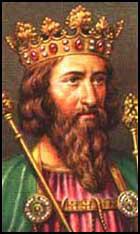King Edward III

Edward, the eldest son of Edward II and Isabella of France, was born in 1312. Edward was only fourteen when his father was murdered and for the first three years of his reign was under the influence of his mother and her lover, Roger Mortimer. This ended in 1330 when Edward had Mortimer executed and his mother removed from the royal court.
Edward married Philippa of Hainault. The couple had twelve children, nine of whom survived: Edward, the Black Prince, Isabella, Joan, Lional (Duke of Clarence), John of Gaunt (Duke of Lancaster), Edmund (Duke of York), Mary, Margaret, Thomas (Duke of Gloucester).
A good leader of soldiers, Edward III was soon avenging the defeats suffered by his father in Scotland. In 1333 Edward defeated David II of Scotland at the Battle of Halidon Hill. Five years later Edward invaded France (the start of the Hundred Years War). Edward wanted to win back land lost by King John and victories at Crecy (1346) and Poitiers (1356) turned him into a military hero. His eldest son, Edward, the Black Prince, also gained a reputation for being a great soldier.
Edward had to deal with the economic problems caused by the Black Death. Attempts to control wage levels by introducing the Statute of Labourers Act made him unpopular with the people.
By 1360 Edward was able to negotiate a deal that gave him control over nearly a quarter of France. However, the king's wars proved expensive and when English forces suffered defeats in France during the next few years, Edward began to lose the support of the people. In 1376, Parliament rebelled against the cost of the war and refused to grant the king the money needed to continue fighting in France.
Heart-broken by the death of his son, the Black Prince, Edward's mind began to go during the last years of his reign. John of Gaunt, took over much of the responsibility of government until Edward III's death in 1377.
Student Activities
Medieval Historians and John Ball (Answer Commentary)
The Peasants' Revolt (Answer Commentary)
Death of Wat Tyler (Answer Commentary)
Taxation in the Middle Ages (Answer Commentary)
Medieval and Modern Historians on King John (Answer Commentary)
King John and the Magna Carta (Answer Commentary)
Henry II: An Assessment (Answer Commentary)
Richard the Lionheart (Answer Commentary)
Christine de Pizan: A Feminist Historian (Answer Commentary)
The Growth of Female Literacy in the Middle Ages (Answer Commentary)
Women and Medieval Work (Answer Commentary)
The Medieval Village Economy (Answer Commentary)
Women and Medieval Farming (Answer Commentary)
Contemporary Accounts of the Black Death (Answer Commentary)
Disease in the 14th Century (Answer Commentary)
King Harold II and Stamford Bridge (Answer Commentary)
The Battle of Hastings (Answer Commentary)
William the Conqueror (Answer Commentary)
The Feudal System (Answer Commentary)
The Domesday Survey (Answer Commentary)
Thomas Becket and Henry II (Answer Commentary)
Why was Thomas Becket Murdered? (Answer Commentary)
Illuminated Manuscripts in the Middle Ages (Answer Commentary)
